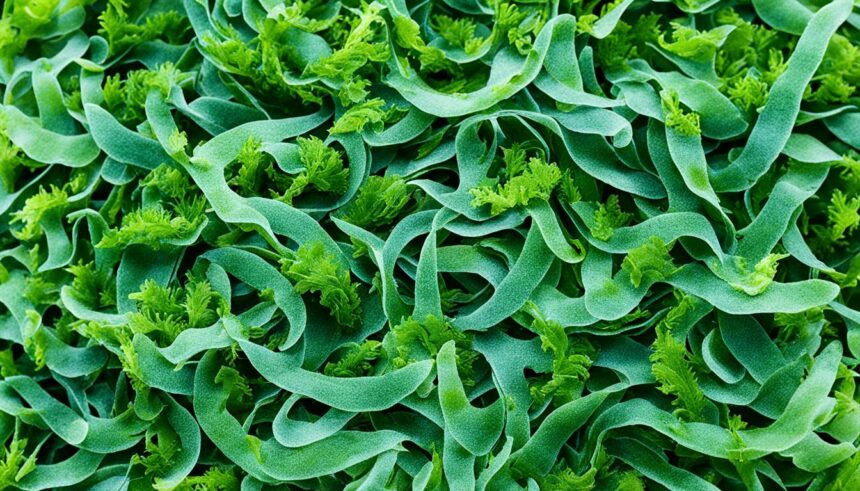Welcome to our exploration of seaweed‘s nutritional value! In this article, we will delve into the topic of whether seaweed contains vitamins. By understanding the important role that vitamins play in seaweed and their potential benefits for our health and well-being, we can make informed decisions about incorporating this nutrient-packed oceanic plant into our diet.
But first, let’s take a closer look at the overall nutritional profile of seaweed. Understanding the vitamins and minerals commonly found in various types of seaweed is key to appreciating its potential health benefits.
Key Takeaways:
- Seaweed is a nutrient-rich oceanic plant.
- It contains various vitamins and minerals essential for maintaining a balanced diet.
- Vitamins in seaweed include vitamin A, vitamin C, vitamin K, and various B vitamins.
- Seaweed vitamins can contribute to immune function, healthy skin, and increased energy levels.
- There are many delicious ways to incorporate seaweed into a nutritious diet, such as salads, soups, sushi, and more.
Understanding Seaweed’s Nutritional Profile
When it comes to maintaining a balanced diet, understanding the nutritional profile of seaweed is essential. This remarkably versatile marine plant offers a plethora of vitamins and minerals, making it a valuable addition to any healthy eating plan. Let’s delve into the rich world of seaweed’s nutritional value and explore the vitamins and minerals commonly found in different types of seaweed.
Seaweed boasts an impressive vitamin and mineral profile. It contains a wide range of essential nutrients necessary for optimal health and well-being. From vitamins A, C, and K to a variety of B vitamins, seaweed offers a diverse array of vitamins that contribute to its nutritional value.
Vitamins:
- Vitamin A: Supports healthy vision, immune function, and skin health.
- Vitamin C: Functions as a powerful antioxidant, supports immune function, and aids collagen synthesis.
- Vitamin K: Essential for blood clotting and bone health.
- B Vitamins: Contribute to energy production, brain function, and help maintain healthy skin, hair, and nails.
Additionally, seaweed is an abundant source of minerals that are vital for various bodily functions. These minerals include iodine, iron, calcium, potassium, magnesium, and zinc.
Minerals:
- Iodine: Crucial for thyroid function and the production of thyroid hormones.
- Iron: Required for the production of red blood cells and oxygen transport.
- Calcium: Essential for strong bones and teeth, as well as muscle and nerve function.
- Potassium: Plays a role in maintaining healthy blood pressure and supporting heart function.
- Magnesium: Supports muscle function, energy production, and bone health.
- Zinc: Necessary for immune function, wound healing, and DNA synthesis.
By understanding the wealth of vitamins and minerals present in seaweed, we can truly appreciate its nutritional value. These essential nutrients contribute to the overall health benefits associated with consuming seaweed as part of a well-rounded diet.
| Vitamins | Minerals |
|---|---|
| Vitamin A | Iodine |
| Vitamin C | Iron |
| Vitamin K | Calcium |
| B Vitamins | Potassium |
| Magnesium | |
| Zinc |
Note: The table represents a general overview and is not exhaustive. Different types of seaweed may have varying nutrient compositions.
Unveiling the Vitamin Content in Seaweed
Seaweed is not only a delicious addition to various dishes but also a powerhouse of nutrients. In this section, we will explore the vitamin content in different types of seaweed and discover the specific vitamins that make seaweed such a valuable part of a nutritious diet.
Seaweed contains a wide range of vitamins that contribute to its overall nutritional value. Let’s take a closer look at some of the essential vitamins found in seaweed:
Vitamin A: Seaweed is known for its high vitamin A content, which plays a vital role in promoting healthy vision, supporting immune function, and maintaining healthy skin and mucous membranes.
Vitamin C: Seaweed is also a rich source of vitamin C, an antioxidant that helps protect the body against free radicals, supports immune function, and aids in collagen synthesis.
Vitamin K: Another important vitamin found in seaweed is vitamin K. Vitamin K plays a crucial role in blood clotting and bone health, making it essential for maintaining a healthy body.
B Vitamins: Various types of seaweed contain different B vitamins, such as thiamine (B1), riboflavin (B2), niacin (B3), folate (B9), and cobalamin (B12). These vitamins are involved in energy production, cell metabolism, red blood cell formation, and neurological function.
By incorporating seaweed into your diet, you can benefit from these vitamins and their numerous health-promoting properties. Let’s dive deeper into the specific vitamin content of popular seaweed varieties:
| Seaweed Variety | Vitamin A | Vitamin C | Vitamin K | B Vitamins |
|---|---|---|---|---|
| Nori | High | Moderate | Low | Varying levels |
| Kombu | Low | Low | High | B12 |
| Dulse | Low | Moderate | Low | Varying levels |
As shown in the table, different seaweed varieties offer varying levels of vitamins, allowing you to choose the ones that meet your specific nutritional needs. Incorporating a variety of seaweed types into your diet can provide a comprehensive range of vitamins for optimal health.
With their abundant vitamin content, seaweed can be a valuable addition to any diet. In the next section, we will explore the various health benefits that seaweed vitamins offer and how they contribute to overall well-being.
Benefits of Seaweed Vitamins for Health
Seaweed vitamins offer a range of potential benefits for our overall health and well-being. These vitamins, found in various types of seaweed, play a crucial role in supporting our body’s functions and promoting optimal health.
Let’s take a closer look at some of the key benefits that seaweed vitamins can provide:
1. Support Immune Function
Seaweed vitamins, such as vitamin C and vitamin A, are known for their immune-boosting properties. These vitamins help strengthen our immune system, making it more efficient in fighting off infections and diseases.
2. Promote Healthy Skin
Vitamins found in seaweed, like vitamin E and vitamin C, are essential for maintaining healthy skin. They help protect the skin from damage caused by free radicals, promote collagen production, and improve overall skin health.
3. Boost Energy Levels
Seaweed vitamins, particularly the B vitamins, play a vital role in converting the food we eat into energy. They help support our metabolism and ensure our body has the necessary energy to function optimally.
4. Enhance Bone Health
Seaweed contains vitamins like vitamin K and vitamin D, which are crucial for bone health. These vitamins aid in calcium absorption and contribute to maintaining strong and healthy bones, potentially reducing the risk of osteoporosis.
By incorporating seaweed into our diet, either through direct consumption or as a supplement, we can harness the benefits of these vital vitamins. Seaweed offers a natural and nutritious way to support various aspects of our health.
Next, we will explore how to incorporate seaweed into a balanced and nutritious diet, providing practical tips and ideas to enjoy this nutritious marine treasure.

Nutritional Comparison of Seaweed Varieties
| Seaweed Type | Vitamin A (IU) | Vitamin C (mg) | Vitamin K (mcg) | Vitamin B12 (mcg) |
|---|---|---|---|---|
| Nori | 1800 | 2 | 5 | 0 |
| Kelp | 15 | 3 | 89 | 0 |
| Dulse | 7 | 6 | 0 | 0 |
| Wakame | 60 | 6 | 72 | 0 |
This table provides a nutritional comparison of different seaweed varieties, highlighting their vitamin content. As you can see, seaweed is a rich source of vitamins, with each variety offering its unique nutritional profile. Incorporating a variety of seaweed types into your diet can help ensure you receive a broad range of essential vitamins.
Incorporating Seaweed into a Nutritious Diet
Seaweed is not just a trendy ingredient; it offers a wealth of nutrients that can enhance your overall diet. Here, we share practical tips on how to incorporate seaweed into a balanced and nutritious eating plan.
Versatile Seaweed Delights
Seaweed can be enjoyed in various ways, adding a unique flavor and texture to your meals. Here are some ideas:
- Savor the Crunch: Crumble dried seaweed flakes over salads or soups for a delightful crunchy topping.
- Roll with Sushi: Experiment with making your own sushi rolls and include sheets of nori seaweed for an authentic touch.
- Blend into Smoothies: Add powdered seaweed (such as spirulina) to your favorite green smoothie recipe for an extra boost of nutrients.
- Cook with Wakame: Try cooking with wakame seaweed in stir-fries or use it as a delicious addition to soups.
By incorporating seaweed into your dishes, you can elevate both the taste and nutritional value.
The Importance of Moderation and Variety
While seaweed offers impressive nutritional benefits, it’s important to remember the principle of moderation. Like any food, it’s best to consume seaweed in appropriate quantities as part of a well-rounded diet.
Additionally, seek variety in your overall nutrient intake. While seaweed is rich in certain vitamins and minerals, it’s essential to embrace a diverse range of foods to ensure you’re getting a wide spectrum of nutrients.
Unlock the Power of Seaweed in Your Meals
Including seaweed in your diet is a delicious and nutritious way to enhance your overall well-being. Whether you’re a fan of seaweed-infused dishes or are just starting to explore its flavors, there are many ways to reap the benefits of seaweed’s nutrients. Take the opportunity to experiment with incorporating seaweed into your diet, and discover the incredible flavors and health advantages it offers.
Understanding Parkinson’s Disease: Unraveling the Mysteries of a Neurological Disorder
Conclusion
In conclusion, incorporating seaweed into our diet can provide valuable health benefits due to its rich vitamin content. Seaweed is a natural source of vitamins, including vitamin A, vitamin C, vitamin K, and various B vitamins. These vitamins play important roles in our overall health and well-being.
By consuming seaweed, whether as a delicious ingredient in dishes or as a dietary supplement, we can harness its nutritional value and support our immune system, promote healthy skin, and boost our energy levels. Seaweed offers a convenient and sustainable way to incorporate essential vitamins into a well-rounded, nutrient-dense diet.
With its versatility, seaweed can be enjoyed in various forms and preparations. From adding it to salads, soups, and sushi to incorporating it into innovative recipes, there are numerous ways to savor its unique flavor and reap its nutritional benefits. As with any food, moderation is key, and it’s important to seek variety in our diet to ensure a diverse intake of nutrients.
By embracing seaweed as a part of our culinary repertoire, we can not only explore new flavors but also nourish our bodies with its valuable vitamin content. So, why not venture into the world of seaweed and discover how this oceanic superfood can enhance our well-being and contribute to a healthier lifestyle?
FAQ
Does seaweed contain vitamins?
Yes, seaweed contains a variety of vitamins that contribute to its nutritional value. Depending on the type of seaweed, it can contain vitamins A, C, K, and various B vitamins.
What are the benefits of seaweed vitamins?
Seaweed vitamins offer several potential health benefits. They can support immune function, promote healthy skin, boost energy levels, and contribute to overall well-being.
How can I incorporate seaweed into my diet?
There are various ways to incorporate seaweed into a nutritious diet. You can use it in salads, soups, sushi, or even as a seasoning for other dishes. Just remember to consume seaweed in moderation and seek variety in your overall nutrient intake.










